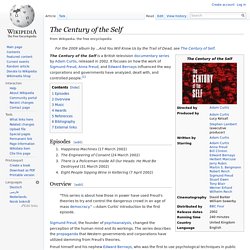

» [Vidéo] Les quatre cavaliers (avec Noam Chomsky, Joseph Stiglitz, John Perkins, etc.) Source : Le Partage, 14-01-2016 Les quatre cavaliers (« Four Horsemen ») est un film indépendant de 2012 réalisé par Ross Ashcroft, qui dévoile les rouages du système économique dominant actuellement la planète.
![» [Vidéo] Les quatre cavaliers (avec Noam Chomsky, Joseph Stiglitz, John Perkins, etc.)](http://cdn.pearltrees.com/s/pic/th/cavaliers-chomsky-stiglitz-123921913)
La croissance infinie et la recherche du profit ont poussé l’humanité au bord du précipice. Et les quatre cavaliers d’aujourd’hui sont la violence, la dette, l’inégalité et enfin la pauvreté. Si leurs galops infernaux ne sont pas arrêtés, ils risquent de compromettre la pérennité des futures générations. L’économie mondiale va mal. Le Parti pirate a dix ans, et plus beaucoup de dents. 1er janvier 2016, le mouvement pirate a fêté son dixième anniversaire, puisqu’il y a exactement dix ans, le Suédois Rick Falkvinge lançait un appel à fonder un « parti des pirates ».

A l’occasion de cet anniversaire, il a écrit un article récapitulatif sur les réussites et les échecs d’un mouvement citoyen né sur Internet et aujourd’hui présent dans des parlements. J’ai été secrétaire national du Parti pirate en France, et voudrais profiter de cet anniversaire pour revenir sur cette histoire et interroger les raisons de l’échec de ce mouvement. Les successeurs des écolos Le Parti pirate est avant tout un mouvement citoyen.
Nous avons été apparentés parfois à un parti de l’Internet, similaire à celui que Kim Dotcom a voulu monter en Nouvelle-Zélande, mais ça n’a rien à voir. En ce sens, nous sommes les successeurs des écologistes. Le drapeau du Parti pirate lors de l’assemblée générale du Parti pirate international à Paris, en 2014 - Anton Nordenfur/Flickr/CC Des victoires invisibles.
Conversation avec Jacques Attali. Réseaux, lobbies, conflits d'intérêts. The Century of the Self. The Century of the Self is a British television documentary series by Adam Curtis, released in 2002.

It focuses on how the work of Sigmund Freud, Anna Freud, and Edward Bernays influenced the way corporations and governments have analyzed, dealt with, and controlled people.[1] Episodes[edit] Happiness Machines (17 March 2002)The Engineering of Consent (24 March 2002)There is a Policeman Inside All Our Heads: He Must Be Destroyed (31 March 2002)Eight People Sipping Wine in Kettering (7 April 2002) Overview[edit] "This series is about how those in power have used Freud's theories to try and control the dangerous crowd in an age of mass democracy. " Sigmund Freud, the founder of psychoanalysis, changed the perception of the human mind and its workings. Freud himself and his nephew Edward Bernays, who was the first to use psychological techniques in public relations, are discussed. Music[edit] Awards[edit] According to BBC publicity[8] Nominated for: The Century of the Self - 1 of 4 - Happiness Machines. The Century of the Self - 2 of 4 - The Engineering of Consent. The Century of the Self - 3 of 4 - There is Policeman Inside all our Heads, He Must Be Destroyed.
The Century of the Self - 4 of 4 - Eight People Sipping Wine in Kettering. Globalization. Globalisation (or globalization) is the process of international integration arising from the interchange of world views, products, ideas, and other aspects of culture.[1][2] Advances in transportation and telecommunications infrastructure, including the rise of the telegraph and its posterity the Internet, are major factors in globalization, generating further interdependence of economic and cultural activities.[3] Though scholars place the origins of globalization in modern times, others trace its history long before the European age of discovery and voyages to the New World.
Some even trace the origins to the third millennium BCE.[4][5] In the late 19th century and early 20th century, the connectedness of the world's economies and cultures grew very quickly. Overview[edit] Humans have interacted over long distances for thousands of years. Airline personnel from the "Jet set" age, circa 1960. Etymology and usage[edit] Sociologists Martin Albrow and Elizabeth King define globalization as:
Politique & Ecologie.